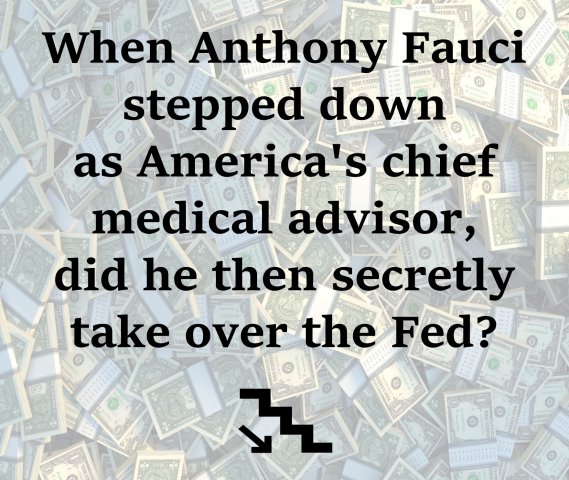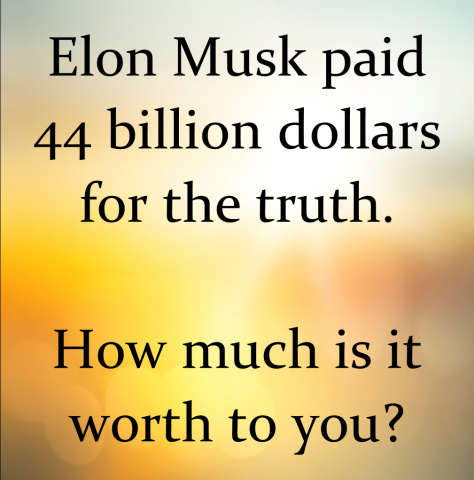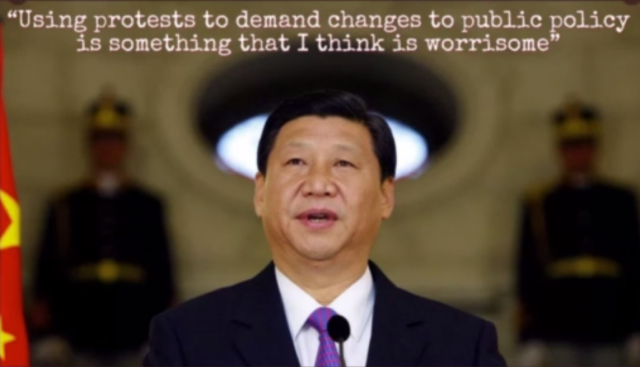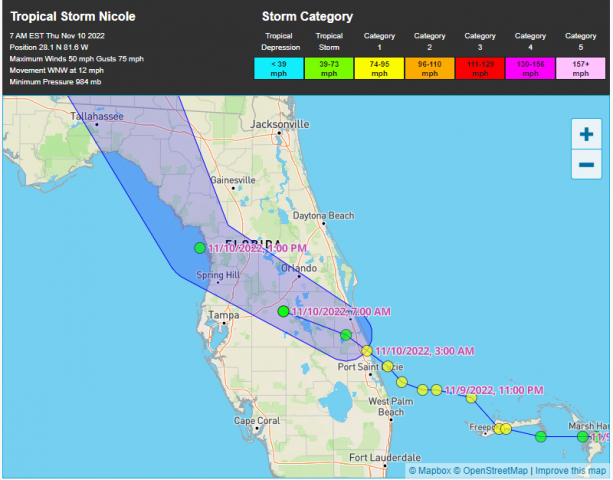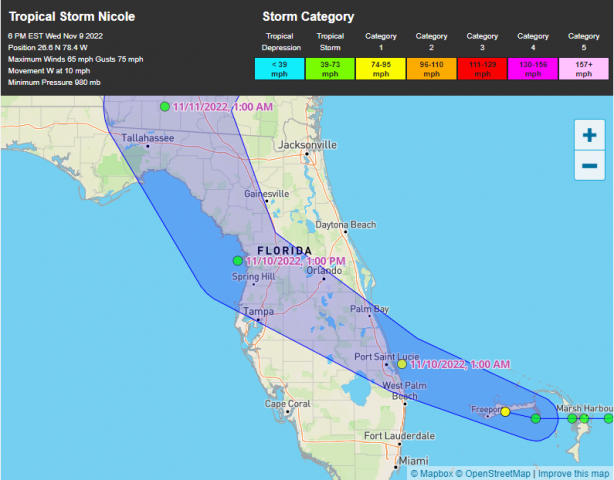In times of crisis, traditional rules of procedural fairness can be modified.
So said Gerard Kennedy, Canadian law professor and politician, on the freezing of protesters' bank accounts. (You can read his testimony here.)
The best and truest rejoinder to that I've heard came, I think, from David Freiheit (also a Canadian lawyer):
In times of crisis, traditional rules of fairness need to be fortified, not modified.
As most of you know, David Freiheit (Viva Frei) has been my favorite Canadian lawyer since sometime in 2020. Even though he no longer practices law and subsequently fled Canada for Florida, for the sake of his kids. I haven't posted anything from him in a while, because, frankly, his explosion of fame following his livestream coverage of the Canadian truckers' Freedom Convoy has meant that I can't possibly keep up with him.
However, we recently made time for his 1.5-hour interview with Dr. Bret Weinstein, and except for the first three minutes, every second was worthwhile. We were even happy to listen to it at normal speed (which we have to do when watching it on television instead of on the computer) because the information content is dense.
Since most of you will find the time commitment untenable, please at least take ten minutes and listen to minutes 21 through 31, and Bret's story about the incredible discovery he made in his grad school research about cancer, longevity, and the laboratory mice used in drug safety testing. If that whets your appetite for the rest of the interview, so much the better.
Bret is an excellent speaker: clear, cogent, and riveting. Viva and the other host, Robert Barnes, are normally quite interactive with their guests, sometimes to the point where I wish they would shut up and let the guest continue speaking. Not this time. As one commenter put it, "Watching Barnes and Frei blink for 10 minutes or more at a time with their lips closed is so unnatural...." Bret is that interesting.
I've been watching Bret's DarkHorse Podcasts for quite a while now, and I still learned a lot here. Skip the first three minutes—after that it's gold.
I have no quarrel with parents who are up in arms at Sesame Street's decision to use cute little Elmo to push the COVID-19 vaccine on children. It's horrendous, despicable, a violation of the sacred trust between a show meant for children, and their parents.
But in a way I'm grateful that Sesame Street's writers, producers, and funders have finally come so far out of the closet. It's about time parents noticed.
There may have been a time when the show stuck with teaching basic reading and math skills, but once you decide that the purpose of your project is teaching children, it's only a small step to teaching them whatever you happen to think important—and before you know it, numbers and letters have taken a back seat to social and political activism. It reminds me of a young, idealistic teacher I heard interviewed the other day, who was in tears because she had become a teacher in order to "teach children social justice," and felt stifled under pressure to teach them academics.
Schools, and television shows aimed at children, have a widely-acknowledged—if mostly ignored—obligation to support the rights, values, and priorities of the children's families. Little by little both of these important institutions have blatantly and flagrantly violated that unwritten contract.
Maybe that's the best lesson Elmo can teach us.
One year ago, the Canadian truckers of the Freedom Convoy rolled into Ottawa, Ontario, their swelling ranks cheered on by people all along their cross-country journey. Protesting Canada's draconian COVID-19 restrictions, they were joined in the capital city by supporters from just about any demographic you can think of. Thanks to everyday folks with cell phone cameras, and indefatigable citizen reporters like David Freiheit* (Viva Frei), we observed the event moment-by-moment, live, unscripted, and unedited. The dissonance between the peaceful, joyful, unifying protest that we saw, and the horrific event portrayed on Canada's national media—picked up, of course, by our own major news sources—was staggering.
(As one who grew up with the seemingly-constant threat of Quebec to secede from the country, one of my strongest memories is of the Québécois at the protest, who declared, "We were Separatists, but after this we are no longer!")
As I watched the days unfold, from the hopeful beginnings to Prime Minister Trudeau's extraordinary invocation of the Emergencies Act, I was moved as I haven't been since 1968, which saw the rise and fall of hope and freedom during Czechoslovakia's Prague Spring. It may not have been Russian tanks rolling through Ottawa as they did through Prague, but the intent was much the same. It took Czechoslovakia another twenty years to win their freedom from Russia; is it better or worse for Canada that their oppression comes from within, instead of from an external enemy?
I've grouped my own posts on the subject here under the topic "Freedom Convoy." If you follow that link you'll see them listed in reverse order (scroll down for the oldest). There you can also see for yourself a selection of Viva's on-the-street videos.
Russia's invasion of the Ukraine obscured both the protest and the issues that provoked it, taking the heat off Prime Minister Trudeau. But I will not let the heroic Freedom Convoy be forgotten—at least in my very tiny corner of the Internet. This beautiful 14-minute tribute by JB TwoFour (about whom I know nothing but this) still moves me to tears.
Permalink | Read 996 times | Comments (0)
Category Hurricanes and Such: [first] [previous] [next] [newest] Freedom Convoy: [first] [previous] [newest]
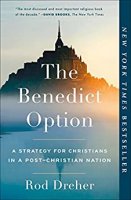 The Benedict Option: A Strategy for Christians in a Post-Christian Nation by Rod Dreher (Sentinel, 2017)
The Benedict Option: A Strategy for Christians in a Post-Christian Nation by Rod Dreher (Sentinel, 2017)
I read Live Not By Lies first. The Benedict Option was written three years earlier, and the two make good companion pieces for asking vitally important questions about our lives, our priorities, and our actions. In Live Not by Lies I preferred the first half of the book to the second; with The Benedict Option my reaction was the opposite. I find myself quarrelling with Dreher in a number of places, but nonetheless highly recommend both books, because he is observant, and he is asking the important questions. Dreher predicts very hard times coming for Christians—and others—as our society diverges more and more radically from its classical Western and Christian roots and values.
In my review of Live Not by Lies I mentioned that despite being specifically written for Christians, it's an important book for a much wider audience. The Benedict Option is less comprehensive in scope, especially the first part, but still useful. In Kindle form, it's currently $10, but if you use eReaderIQ and are patient, you can get it for quite a bit less. And don't forget your public library!
You know I'm not in the business of summarizing books. I don't do it well, for one thing. When one of our grandsons was very young, if you asked him what a book was about, he would instead rattle off the whole thing, word for word from memory. I'm like that, minus the superb memory. But secondarily, I don't think summaries do a good book any favors. The author has put together his arguments, or his plot and characters, in the way he thinks best, and trying to pull it apart and reduce it seems to me rude and unfair. Or maybe I'm just trying to justify my weakness, I don't know.
But if I were forced to write my simplest take-away from The Benedict Option, it would be this: Riding along with the current of mainstream culture may have worked all right for us when American culture was solidly rooted in Judeo-Christian and Western ideals, but that time is long gone. Doing the right thing—whatever that might be in a given situation—might never have been easy, but it's harder than when I was young, and it's on track to get much worse.
With that cheerful thought, here are a few quotes. Bold emphasis is my own.
Rather than wasting energy and resources fighting unwinnable political battles, we should instead work on building communities, institutions, and networks of resistance that can outwit, outlast, and eventually overcome the occupation. (p. 12).
I agree wholeheartedly about building communities, institutions, and networks. However, I don't think we should abandon political work. After all, for half a century, Roe v. Wade looked absolutely unassailable, and now there's at least a small crack. Prudence would say to do both: attend to politics (a civic duty, anyway), without putting our faith in political solutions, and at the same time prioritize the building of helpful communities, institutions, networks—and especially families.
The 1960s were the decade in which Psychological Man came fully into his own. In that decade, the freedom of the individual to fulfill his own desires became our cultural lodestar, and the rapid falling away of American morality from its Christian ideal began as a result. Despite a conservative backlash in the 1980s, Psychological Man won decisively and now owns the culture—including most churches—as surely as the Ostrogoths, Visigoths, Vandals, and other conquering peoples owned the remains of the Western Roman Empire. (pp. 41-42).
People today who are nostalgic for the 1960's are mostly those who didn't live through them, I think. It was not a nice time.
Legend has it that in an argument with a cardinal, Napoleon pointed out that he had the power to destroy the church. “Your majesty,” the cardinal replied, “we, the clergy, have done our best to destroy the church for the last eighteen hundred years. We have not succeeded, and neither will you.”
(p. 49).
You can achieve the peace and order you seek only by making a place within your heart and within your daily life for the grace of God to take root. Divine grace is freely given, but God will not force us to receive it. It takes constant effort on our part to get out of God’s way and let His grace heal us and change us. To this end, what we think does not matter as much as what we do—and how faithfully we do it. (p. 52).
[T]he day is coming when the kind of thing that has happened to Christian bakers, florists, and wedding photographers will be much more widespread. And many of us are not prepared to suffer deprivation for our faith. This is why asceticism—taking on physical rigors for the sake of a spiritual goal—is such an important part of the ordinary Christian life. ... [A]scetical practices train body and soul to put God above self. ... To rediscover Christian asceticism is urgent for believers who want to train their hearts, and the hearts of their children, to resist the hedonism and consumerism at the core of contemporary culture. (pp. 63-64).
For most of my life ... I moved from job to job, climbing the career ladder. In only twenty years of my adult life, I changed cities five times and denominations twice. My younger sister Ruthie, by contrast, remained in the small Louisiana town in which we were raised. She married her high school sweetheart, taught in the same school we attended as children, and brought up her kids in the same country church.
When she was stricken with terminal cancer in 2010, I saw the immense value of the stability she had chosen. Ruthie had a wide and deep network of friends and family to care for her and her husband and kids during her nineteen-month ordeal. The love Ruthie’s community showered on her and her family made the struggle bearable, both in her life and after her death. The witness to the power of stability in the life of my sister moved my heart so profoundly that my wife and I decided to leave Philadelphia and move to south Louisiana to be near them all. (pp. 66-67)
Dreher wrote about his sister's struggle and the effect it had on him in The Little Way of Ruthie Leming, which I have also read, and may eventually review. As with all of his books, I have mixed feelings about that one. He idolizes his sister and her choices in a way I find uncomfortable, and reduces almost to a footnote the damage those choices did, to him and to others.
Saint Benedict commands his monks to be open to the outside world—to a point. Hospitality must be dispensed according to prudence, so that visitors are not allowed to do things that disrupt the monastery’s way of life. For example, at table, silence is kept by visitors and monks alike. As Brother Augustine put it, “If we let visitors upset the rhythm of our life too much, then we can’t really welcome anyone.” The monastery receives visitors constantly who have all kinds of problems and are seeking advice, help, or just someone to listen to them, and it’s important that the monks maintain the order needed to allow them to offer this kind of hospitality. (p. 73).
Father Benedict believes Christians should be as open to the world as they can be without compromise. “I think too many Christians have decided that the world is bad and should be avoided as much as possible. Well, it’s hard to convert people if that’s your stance,” he said. “It’s a lot easier to help people to see their own goodness and then bring them in than to point out how bad they are and bring them in.” (p. 73).
Though orthodox Christians have to embrace localism because they can no longer expect to influence Washington politics as they once could, there is one cause that should receive all the attention they have left for national politics: religious liberty. Religious liberty is critically important to the Benedict Option. Without a robust and successful defense of First Amendment protections, Christians will not be able to build the communal institutions that are vital to maintaining our identity and values. What’s more, Christians who don’t act decisively within the embattled zone of freedom we have now are wasting precious time—time that may run out faster than we think. (p. 84).
I know the book was written for Christians, but I wish Dreher had also emphasized how important this is for everyone. No one can afford to ignore the trampling of someone's Constitutional rights, even if they don't affect us personally. If Christians lose their First Amendment protections, no person, no group, no idea is safe.
Lance Kinzer is living at the edge of the political transition Christian conservatives must make. A ten-year Republican veteran of the Kansas legislature, Kinzer left his seat in 2014 and now travels the nation as an advocate for religious liberty legislation in statehouses. “I was a very normal Evangelical Christian Republican, and everything that comes with that—particularly a belief that this is ‘our’ country, in a way that was probably not healthy,” he says. That all fell apart in 2014, when Kansas Republicans, anticipating court-imposed gay marriage, tried to expand religious liberty protections to cover wedding vendors, wedding cake makers, and others. Like many other Republican lawmakers in this deep-red state, Kinzer expected that the legislation would pass the House and Senate easily and make it to conservative Governor Sam Brownback’s desk for signature. It didn’t work out that way at all. The Kansas Chamber of Commerce came out strongly against the bill. State and national media exploded with their customary indignation. Kinzer, who was a pro-life leader in the House, was used to tough press coverage, but the firestorm over religious liberty was like nothing he had ever seen. The bill passed the Kansas House but was killed in the Republican-controlled Senate. The result left Kinzer reeling. “It became very clear to me that the social conservative–Big Business coalition politics was frayed to the breaking point and indicated such a fundamental difference in priorities, in what was important,” he recalls. “It was disorienting. I had conversations with people I felt I had carried a lot of water for and considered friends at a deep political level, who, in very public, very aggressive ways, were trying to undermine some fairly benign religious liberty protections.”
...
Over and over he sees ... legislators who are inclined to support religious liberty taking a terrible pounding from the business lobby. (p. 84-86).
Nothing matters more than guarding the freedom of Christian institutions to nurture future generations in the faith. (p. 87).
Agreed—except that I would put "Christian parents" or just "parents" ahead of "institutions." Dreher is a strong advocate for Christian schools at every level, especially the so-called Classical Christian schools with their emphasis on rigorous academics. However, he gives short shrift to home education, an option that is at least as important and in need of support.
Because Christians need all the friends we can get, form partnerships with leaders across denominations and from non-Christian religions. And extend a hand of friendship to gays and lesbians who disagree with us but will stand up for our First Amendment right to be wrong. (p. 87).
Over and over again I have seen the importance of these partnerships. In all the "fringe" movements I've been a part of, from home education to home birth to small and sustainable agriculture, this collaboration with others with whom we had next to nothing else in common made progress for the movements, and—which was perhaps even more valuable—forced us to work beside and learn to appreciate those who were in other ways our political opponents.
Most American Christians have no sense of how urgent this issue is and how critical it is for individuals and churches to rise from their slumber and defend themselves while there is still time. We do not have the luxury of continuing to fight the last war. (pp. 87-88).
Permalink | Read 1583 times | Comments (0)
Category Reviews: [first] [previous] [next] [newest] Education: [first] [previous] [next] [newest] Hurricanes and Such: [first] [previous] [next] [newest] Children & Family Issues: [first] [previous] [next] [newest] Last Battle: [first] [previous] [next] [newest]
The supporting documentation is long and complex and I don't expect anyone to read it all. But I include the link anyway.
Some professors from the Johns Hopkins Institute for Applied Economics, Global Health, and the Study of Business Enterprise did a meta-analysis of the effectiveness of "compulsory, non-pharmaceutical interventions" (e.g. lockdowns) on COVID-19 mortality.
The short version:
Lockdowns have had little to no effect on COVID-19 mortality.
The longer, but more detailed, policy implications:
In the early stages of a pandemic, before the arrival of vaccines and new treatments, a society can respond in two ways: mandated behavioral changes or voluntary behavioral changes. Our study fails to demonstrate significant positive effects of mandated behavioral changes (lockdowns). This should draw our focus to the role of voluntary behavioral changes. Here, more research is needed to determine how voluntary behavioral changes can be supported. But it should be clear that one important role for government authorities is to provide information so that citizens can voluntarily respond to the pandemic in a way that mitigates their exposure.
Finally, allow us to broaden our perspective after presenting our meta-analysis that focuses on the following question: “What does the evidence tell us about the effects of lockdowns on mortality?” We provide a firm answer to this question: The evidence fails to confirm that lockdowns have a significant effect in reducing COVID-19 mortality. The effect is little to none.
The use of lockdowns is a unique feature of the COVID-19 pandemic. Lockdowns have not been used to such a large extent during any of the pandemics of the past century. However, lockdowns during the initial phase of the COVID-19 pandemic have had devastating effects. They have contributed to reducing economic activity, raising unemployment, reducing schooling, causing political unrest, contributing to domestic violence, and undermining liberal democracy. These costs to society must be compared to the benefits of lockdowns, which our meta-analysis has shown are marginal at best. Such a standard benefit-cost calculation leads to a strong conclusion: lockdowns should be rejected out of hand as a pandemic policy instrument.
I agree wholeheartedly that "one important role for government authorities is to provide information so that citizens can voluntarily respond to the pandemic in a way that mitigates their exposure." I would add that this must include clear, non-alarmist information based on the truth, not on "what we think the public deserves to know"; it must include sufficient information for citizens to make intelligent risk-benefit analyses; and it must not include the stifling of public information-sharing and debate, even at the risk of some of the information being wrong.
A long time ago, Pontius Pilate famously asked, "What is truth?"
More recently, Elon Musk questioned, "What is the value of truth?"
Maybe you smoked some pot when you were young. Or know that your parents did. I did not, except second-hand and co-mingled with tobacco smoke, back in the days when our college movie theater—along with nearly everywhere else—put no restrictions on polluting the indoor air. I saw no reason to foul my lungs and risk fouling my brain. Maybe you think you survived your experiences unscathed. Maybe you did—though you will never know.
So maybe you think marijuana is harmless, remembering the fuss and scare-mongering from your youth. Maybe you are thrilled that in many places marijuana has "gone legit." But this is not your father's weed. Perhaps you thought that legalizing marijuana would take it out of the hands of the drug dealers, that it would be purer and safer.
Apparently not.
Truly, the love of money is a root of all sorts of evil. It seems we have not supplanted the illegal drug dealers and dishonest suppliers, but rather supplemented them with equally greedy mega-businesses, and replaced the lone marijuana plant or two growing in someone's apartment with chemical factories producing ultra-high-potency products that can maim and kill.
Here are two links to one family's story, the tragedy that alerted me to the problem.
Mila's Story, on Heather Heying's Natural Selections substack, and What Happened to Our Daughter; the latter is from the family's Slowdown Farmstead substack and tells the same story slightly differently, with more details about the drug problem (and lots of references). Be sure to notice how quickly Mila's mind disintegrated after her first encounter with the drug.
It wasn't just the marijuana that killed Mila. Suicide is always a complex event, with more than one contributing factor.
When you read Mila's story, you'll see that there's no shortage of guilty parties: the school drug counsellor to whom Mila went for help against the addiction that she knew was destroying her, whose response was merely to advise her to "moderate her use"; the First Nations reservation that supplied the dangerous drug "pens" to children, against which the Canadian government was apparently powerless; and most of all, the Canadian governments (federal and provincial) whose draconian COVID-19 restrictions left vulnerable high school students with literally nothing to do and no place to go. The Devil had a field day with those idle hands and minds.
We are just beginning to recognize what is certain eventually to be acknowledged as the truth: that the COVID closures, lockdowns, and travel restrictions, along with masking, social distancing, and vaccine mandates, have destroyed more individuals, families, and relationships than the COVID virus ever did.
Permalink | Read 919 times | Comments (0)
Category Hurricanes and Such: [first] [previous] [next] [newest] Health: [first] [previous] [next] [newest] Politics: [first] [previous] [next] [newest] Children & Family Issues: [first] [previous] [next] [newest]
I found this meme on a Viva Frei video. (The link is to give credit; I'm not asking anyone to watch the video, which is an hour and 40 minutes long.)
I'm leaving it as it is for now, for those who enjoy puzzles. What's going on here? (I'll explain later.)
I'll admit I'm astonished that Robert F. Kennedy, Jr.'s shocking book, The Real Anthony Fauci: Bill Gates, Big Pharma, and the Global War on Democracy and Public Health has not generated more interest, especially since at the time I first wrote about it, the Kindle version was only $3. It's $15 now, and the hardcover close to $20, but I'd say it's still worth it at that price, especially if you can't get it from your local library. Or you can do what I do: put it on a watch list at eReaderIQ; for a brief time yesterday it was only 99 cents. At that price I would have bought copies for a few friends—if I hadn't been away from home for the whole day. I find the eReaderIQ service worth supporting, by the way: it really helps with playing Amazon's little games.
I understand that people might be skeptical, whether, as in my case, from distrust of the Kennedys in general, or from a reluctance to question authority—especially when questioning authority can get you shoved into a "right-wing extremist conspiracy theorist" bucket. If you have the courage to look around outside of your comfort zone, however, I predict you will find this book worth your while.
Here are two short (about 5 minute) videos from my current favorite Left Coast liberal academic scientists, whose genuinely liberal credentials I don't doubt, albeit they also sometimes find themselves flung into the above-mentioned bucket when their search for truth leads them in certain directions. Both videos contain Bret's and Heather's evaluations of the book, and more importantly, their evaluation of its documentation. The videos do well at double speed if you want to save time. Spoiler alert: Bret and Heather are even more concerned than I am, with better reason and authority.
This one is just over five and a half minutes long.
As I said in my review of the book, if what Kennedy claims, with such extensive documentation, is true, why are Dr. Fauci and a whole lot of other people not in jail? If it's not true, why isn't Fauci suing Kennedy for libel? I expected outrage on all sides, refutation, corroboration, investigation.
I did not expect ... silence. That silence on the part of investigative journalists, academic researchers, and medical professionals almost scares me more than the book.
I understand that people's lives are too busy for them to want to tackle a long, dense non-fiction book, so I don't urge you lightly to read The Real Anthony Fauci. But for your own health, and especially for your children, if you can make time to read this book, or listen to it in audiobook format, it has my strongest recommendation. The story is as riveting as it is frightening, and I was surprised at how quickly I finished it. I do recommend the Kindle version; the primary reason I also bought the hardcover was the knowledge that Amazon can make a Kindle book "disappear" at any moment, even from my physical e-reader. Most of the time I'm more comfortable with physical books, but in this case I actually find the digital version friendlier to the eyes. Don't be put off by the fact that the e-book format appears to double the page count (934 vs. 480).
Those who know me know that I do not like horror stories. Even during my Girl Scout days I was not a fan of ghost stories around the campfire. The Real Anthony Fauci is a horror story par excellence, because most of the others are about situations we are very unlikely to experience, and this one has already happened to us—we just didn't recognize it. Nonetheless, I am, as Bret suggests, hopeful: Information is power, and this book has answered questions that have troubled me for decades.
Permalink | Read 1332 times | Comments (0)
Category Reviews: [first] [previous] [next] [newest] Hurricanes and Such: [first] [previous] [next] [newest] Health: [first] [previous] [next] [newest] Politics: [first] [previous] [next] [newest]
The big news is—there is no big news.
Nicole, now a tropical depression, is marching through Georgia rather more peacefully than General Sherman did. It slipped by to the west of us, and although we were theoretically in its grip for much of yesterday, it might have been an unnamed, minor storm, or possibly the effects of a hurricane passing far off at sea. The rains gradually diminished as the day progressed, and only an occasional gust of wind reminded us that something meteorological was going on.
We even went out for lunch in the middle of it all, and noticed only a slight diminution in traffic, although some places were still closed. Not too surprisingly, these were mostly government, church, and medical facilities, institutions not known for being able to turn around on a dime and say, "Okay, it's all good, let's re-open."
There is still risk of flooding, as runoff from already-saturated ground fills already-flooded rivers, but in our own neighborhood we travelled on dry ground the roads that had been so devastatingly flooded by Hurricane Ian.
Were this a century ago, my relatives who lived in Deland would likely have thought it a pretty ordinary day, at least until they heard news from my great-grandfather, the mayor of Daytona Beach. That city, along with others on the east coast, took some significant property damage, though no loss of life.
We are grateful.
Permalink | Read 863 times | Comments (0)
Category Hurricanes and Such: [first] [previous] [next] [newest] Everyday Life: [first] [previous] [next] [newest]
Nicole, having become a hurricane long enough to harrass the western Bahamas and southeast Florida, made landfall around 3 a.m. just south of Vero Beach, a little further north than we expected. I had been awakened a few times during the night by wind gusts and the steady sound of rain. When I got up for real around 4:30 (normal for me), it was clear that our decision to take in the wind chimes, orchid, and trash cans last night was the right thing to do, but everything else was fine.
Of course the day is not over yet; Nicole is currently around Davenport (where we ourselves were on Monday for a friend's birthday party), and heading our way at about 14 mph. But it's now a tropical storm again, and although we are still warned of gusts up to 70 mph, sustained winds where we are look to be less scary than predicted. (I'll take that!)
I greatly enjoyed a few early-morning hours on our back porch, watching what we've had so far from the storm. Because our porch faces west, and the winds were largely from the east, I enjoyed a safe haven with barely an occasional light breeze, while watching the trees whip around somewhat impressively.
Once again, the biggest damage to our neighborhood is likely to be flooding, but we haven't ventured out yet to investigate. Power outages usually come after the storm has passed, so we're not out of the clear there by any means.
Many thanks to those of you who have expressed your concerns, and offered their prayers. I expect to do at least one more update, more if anything untoward happens.
Permalink | Read 917 times | Comments (0)
Category Hurricanes and Such: [first] [previous] [next] [newest] Everyday Life: [first] [previous] [next] [newest]
Nicole is not a hurricane yet, but looks to become one in the Bahamas, and come on shore around Ft. Pierce in the early hours of tomorrow morning, aka the middle of the night tonight. I fully expect to be awakened at least once by our ear-splitting weather radio, hopefully for nothing more serious than that for which it awakened us during Hurricane Ian, and again two days ago.
We were briefly out of "the cone" but are currently back in it, as the predicted path shifts. Of course, the area of strong winds is a lot broader than the cone, and we've been feeling its rain for days. They are still predicting peak sustained winds of 45-60 mph with gusts to 75 mph, which is a "strong tropical storm." Nicole should be off our west coast by 1 p.m. tomorrow, and I'll give an update when I can.
There's a reason we hadn't packed the generator up from the last storm. I hope we don't need it, but with the storm coming straight at us, the ground once again completely saturated, and rivers and lakes still at flood level or very close....
We're still pretty much prepared from last time, though we're waiting till tomorrow to bring things in from outside. My concern when I awoke this morning was for an appointment I had this afternoon at 3 o'clock. Based on today's weather, there was no reason I shouldn't have been able to take it: there's almost no wind yet, and the rain has been steady but not heavy. However, when it was clear that many businesses were deciding to close early, I chose to go in the morning as a "walk-in." I say I chose, but really, I didn't feel I had much choice. Call it a nudge from God, call it hyperactive anxiety—but I couldn't rest about it, and decided I might as well wait for hours there than be unproductive at home. As it turned out, they were able to fit me in quickly and I even made it to the library to pick up The Bellmaker, before it closed at noon. It was definitely the right decision.
Now we wait, hoping that our decision to wait till morning to batten the final hatches turns out to be a good one, too.
Permalink | Read 829 times | Comments (1)
Category Hurricanes and Such: [first] [previous] [next] [newest] Everyday Life: [first] [previous] [next] [newest]
In George Orwell's Nineteen Eighty-Four, most people agree that the climax of the story is when Winston finally breaks under torture and betrays his lover, Julia.
Do it to Julia! Do it to Julia! Not me! Julia! I don’t care what you do to her. Tear her face off, strip her to the bones. Not me! Julia! Not me!
I've written before that I believe the climax to be elsewhere in the book, but Winston's failure here is also a powerful and decisive moment. We may hate Winston for his betrayal and despise him for his cowardice; perhaps instead we sympathise and just feel sad that he has been so completely broken. But how often do we ponder the truth that has been rammed home to me as we are once again directly in the sights of what threatens to become a hurricane.
We are all Winston.
I can keep my spoken and deliberate prayers under control for the most part. I can easily pray that God will diminish, disorganize, disperse, and divert the storm to wherever it will do the least harm. That's my standard hurricane prayer. But I can't deny that at another level, my heart is crying,
"Send it somewhere else! Not here!"
Permalink | Read 1036 times | Comments (0)
Category Hurricanes and Such: [first] [previous] [next] [newest]

